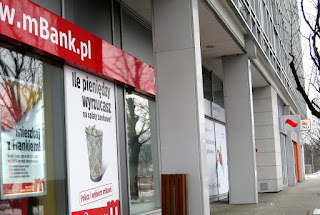Some commentators are calling Eastern Europe the "subprime market" of Europe. Over the past few years, investors from Western Europe clammored to invest in the rapidly-growing Eastern European countries, of which Poland is one of the most stable and prosperous.
The foreign investment is abundantly clear here. When I first arrived in Poland this summer, a banking executive told me that there are over 60 different bank brands in Warsaw, a city of 2.7 million inhabitants. Staggering. Poles have not historically availed themselves of banking services, creating a huge opportunity for foreign banks to offer accounts and sell products--including low interest loans in foreign currencies.
Which brings us to a key dynamic exacerbating the situation. Banks offered insanely low interest rate for Swiss franc- and Euro-denominated mortgage loans. The Polish zoty was very strong, peaking in the summer of 2008, and Poland was on track to join the Euro in 2012. Consumers figured they could save on interest in the meantime by paying in Swiss francs or Euro. But then the zloty started sliding, falling 48% against the Euro since the summer of 2008. Foreign currency became expensive, surprising borrowers whose mortgages suddenly became unaffordable. It was not just mortgage customers who couldn't pay back loans; many companies depend on foreign investment and loans which they now struggle to cover. I know of one bank which signed dozens of leases for branch locations, to be paid in then-inexpensive Euro. The bank has watched as their lease rates rise and rise as the Euro becomes pricier against the zloty.
The problem impacts all of Europe: since many of these loans were offered by foreign banks, mortgage and loan defaults harm business in countries other than Poland. Austria's banking industry is particularly at risk, since it is heavily exposed to Eastern Europe. So we end up with a situation where Polish consumers and businesses cannot pay back loans to Western European countries, who then stop investing in Poland, which means no more development, and no more new jobs. (Unemployment in Poland fell from 20% in 2004 to 9% in the fall of 2008, and has now increased to 10.5% in January 2009.)
I've been loooking around Warsaw and observing these dynamics very clearly in my everyday life. Even my not-so-humble abode in Warsaw is a microcosm of the larger market forces.
Here is the apartment building in which I live:

It is a new development--construction was completed in early 2008--consisting of a couple hundred fancy, modern condominiums. When I moved in in September of 2008, I was one of the only residents in the building. The building's manager told me that many of the units are owned by foreigners who bought the units as investments and planned to let them sit and accrue value. I have noticed a lot more construction in recent months, much to my annoyance. It appears that owners have decided to complete their units (Polish condos are sold incomplete, and owners install cabinets, flooring, etc) so they can either live there or rent them out.
Here is a street level view of my building:

You will notice here three banks:
- mBank is a virtual bank (customers conduct banking online and through SMS messages), owned by Polish BRE Bank, which is owned by German Commerzbank. BRE Bank is one of the first Polish banks, established in the late 1980s. As the first Polish bank to obtain a credit line in 1989, it helped Poland claw out from Communism's iron lock and spur the growth of capitalism.
- BPH is a Polish bank which is 66% owned by GE Money Bank--before that Italian bank UniCredit owned the majority share.
- ING, of course, is a Dutch bank.
No comments:
Post a Comment